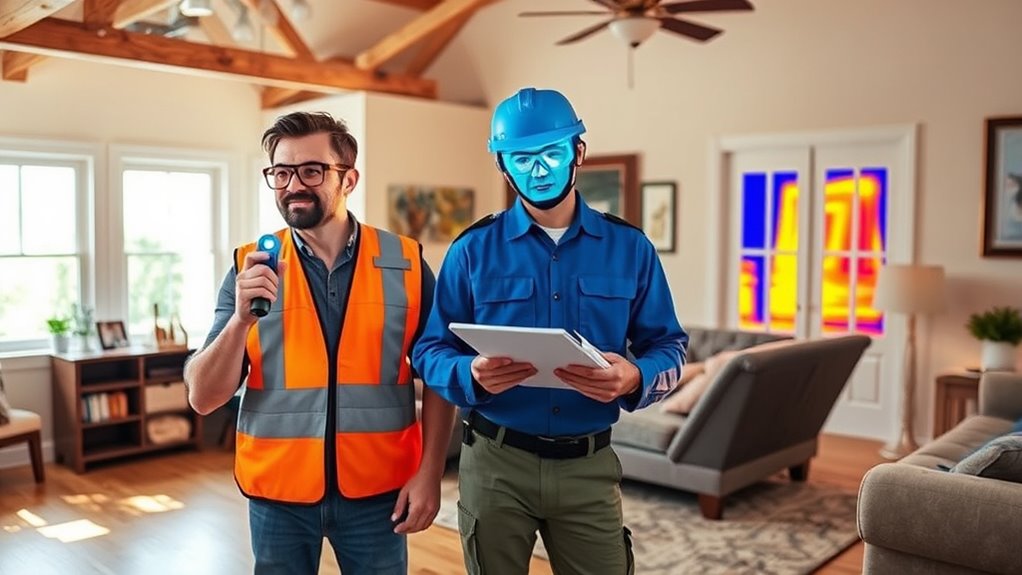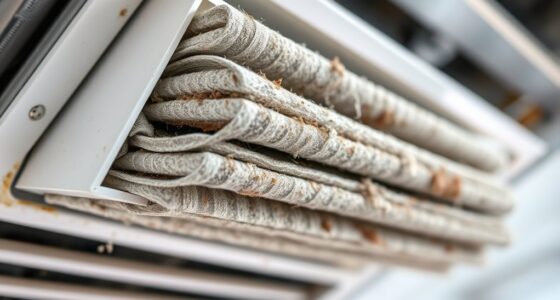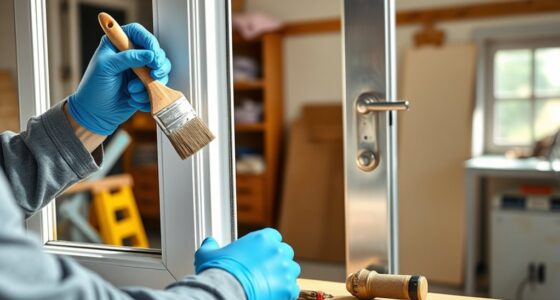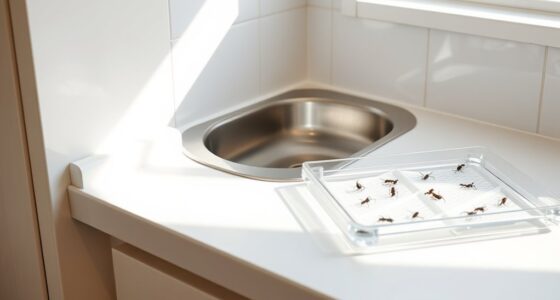A home energy audit helps you find where your house wastes energy and how to fix it. You can do simple DIY checks like inspecting insulation, sealing gaps, and monitoring your utility bills. For a detailed assessment, hiring a professional offers thorough testing, such as blower door tests and tailored recommendations. Whether DIY or pro, making improvements lowers bills and boosts comfort. Keep exploring to discover tips and options suited for your home.
Key Takeaways
- Conduct DIY assessments by checking insulation, sealing drafts, and monitoring utility bills to identify energy inefficiencies.
- Hire professional auditors for detailed blower door tests and tailored recommendations on insulation and appliance upgrades.
- Upgrading insulation in attics, walls, and floors enhances airtightness and reduces energy waste.
- Replacing old appliances with ENERGY STAR-rated models improves efficiency and lowers energy consumption.
- Combining DIY measures with professional guidance optimizes home energy performance and cost savings.

Have you ever wondered how much energy your home uses and where you might be wasting it? Conducting a home energy audit can reveal surprising insights about your energy consumption. One of the most effective ways to improve your home’s efficiency starts with insulation upgrades. Proper insulation helps keep the warm air inside during winter and the cool air during summer, reducing the workload on your heating and cooling systems. If your home has outdated or insufficient insulation, you’ll notice drafts, uneven temperatures, and higher energy bills. Upgrading your insulation isn’t just about comfort; it directly impacts your energy costs by minimizing heat loss and gain. You might consider adding insulation to your attic, walls, or floors, especially in areas where you feel drafts or see visible gaps. These upgrades can be a game-changer, making your home more airtight and energy-efficient.
Upgrade your insulation to boost comfort and cut energy bills through better heat retention and loss prevention.
Alongside insulation improvements, focusing on appliance efficiency plays a *vital* role in reducing your overall energy consumption. Old appliances tend to use more energy than newer, energy-efficient models. Replacing your refrigerator, washer, dryer, or HVAC system with ENERGY STAR-rated appliances can lead to significant savings over time. Not only do these appliances consume less electricity, but they also operate more effectively, providing the same or better performance. During a home energy audit, you might identify appliances that are energy hogs and prioritize replacing them. Sometimes, simply adjusting usage habits—such as running the dishwasher only when full or lowering your water heater temperature—can make a noticeable difference.
A DIY approach to a home energy audit can be straightforward and empowering. Start by checking your home’s insulation status—look for drafts around windows and doors, and feel for cold spots or heat leaks. Use a thermal leak detector or even a simple candle test to see where air might be escaping. Inspect your appliances for signs of inefficiency, like strange noises or inconsistent performance. Keep an eye on your utility bills and compare them month-to-month to spot unusual spikes. Simple measures like sealing gaps, weatherstripping doors and windows, and adjusting your thermostat can immediately improve your home’s energy profile. Recognizing the importance of insulation upgrades can significantly enhance your home’s energy efficiency.
However, for a *thorough* assessment, you might want to hire a professional. They can perform detailed blower door tests and provide expert recommendations on insulation upgrades and appliance efficiency improvements. Whether you do it yourself or call in the pros, the goal remains the same: identify where your home is wasting energy and take targeted steps to fix it. By focusing on insulation and appliances, you’ll not only lower your bills but also create a more comfortable, environmentally friendly living space.
Frequently Asked Questions
How Often Should I Schedule a Home Energy Audit?
You should schedule a home energy audit every 3 to 5 years to keep your home efficient. Regular audits help identify areas for insulation upgrades and guarantee your appliances run efficiently. As your home ages or if you notice higher energy bills, it’s a good idea to get an audit sooner. This proactive approach helps you save money, improve comfort, and reduce your carbon footprint by maintaining ideal insulation and appliance efficiency.
What Are the Signs My Home Needs an Audit?
You might need an energy audit if you notice drafty areas, uneven temperatures, or rising energy bills. Check your insulation inspection to see if it’s sufficient, and evaluate your appliance efficiency—if your appliances seem to be working harder than they should, it’s a good sign. These signs indicate potential issues with insulation or appliance performance, and an audit can help identify improvements to save energy and reduce costs.
Can a Home Energy Audit Increase Property Value?
A home energy audit can boost your property’s value by highlighting energy-efficient features, especially if you plan to incorporate renewable energy or upgrade to a smart home system. When buyers see your commitment to sustainability and smart technology, they’re more likely to pay a premium. Plus, an audit reveals areas to improve, making your home more appealing and future-proof, creating a coincidence that benefits both your wallet and the environment.
Are There Specific Grants or Incentives for Energy Audits?
Yes, you can access government incentives and rebate programs for energy audits. These programs aim to encourage energy efficiency by offering financial support or rebates when you schedule an audit. Check with local, state, or federal agencies to find specific incentives available in your area. Taking advantage of these programs can help offset the costs of a professional or DIY energy audit, making it more affordable to improve your home’s energy efficiency.
How Long Does a Professional Home Energy Audit Typically Take?
Oh, the thrill of a professional home energy audit! It usually takes about 2 to 4 hours, depending on your home’s size and the inspection techniques used. During this time, experts uncover energy savings opportunities with precision, checking everything from insulation to HVAC systems. So, sit back and enjoy the process—they’re uncovering how to make your home more efficient while you relax, knowing your energy bills will thank you.
Conclusion
Think of a home energy audit as your key to revealing hidden savings and comfort. Whether you choose a DIY approach or hire a pro, you’re opening a door to greater efficiency and peace of mind. Like turning on a light in a dark room, this small step brightens your future—saving energy, money, and the environment. Take charge today, and let your home become a symbol of smart, sustainable living.









